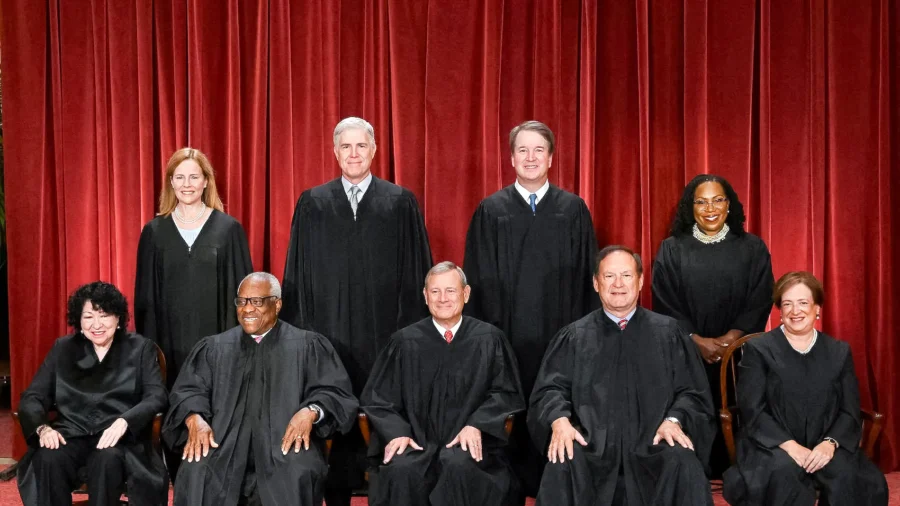The U.S. Supreme Court could issue a ruling as early as Monday regarding a case that bars former President Donald Trump from appearing on primary and general election ballots for the 2024 election.
Late last year, the Colorado Supreme Court ruled that he is disqualified from appearing on ballots in Colorado, citing an interpretation of the U.S. Constitution’s 14th Amendment’s provision that stipulates candidates who engaged in an “insurrection or rebellion” against the United States should be prevented from holding office. Maine’s Democratic secretary of state made a similar decision days later, while a judge in Illinois recently issued a similar ruling to prevent him from ballot access.
The amendment was drafted after the U.S. Civil War more than 150 years ago, and the court was the first to invoke it. But that ruling and the two others are on hold pending the Supreme Court decision.
The former president appealed the Colorado court ruling to the Supreme Court, which took up the matter quickly. Oral arguments in the case were heard last month.
Notably, the Supreme Court has until now never ruled on the provision, Section 3 of the 14th amendment. The court indicated this weekend that at least one case would be decided on Monday, although it did not indicate which one.
Except for when the end of the term nears in late June, the court almost always issues decisions on days when the justices are scheduled to take the bench. But the next scheduled court day isn’t until March 15. And apart from during the coronavirus pandemic when the court was closed, the justices almost always read summaries of their opinions in the courtroom. The justices won’t be there Monday.
If the resolution of the case comes on Monday, a day before Super Tuesday primary contests in 16 states, it would remove uncertainty about whether votes for President Trump, the leading Republican candidate for president, will ultimately count.
Lawyers for the former president asked the nine justices to reverse the Colorado court decision because only Congress can make a determination on who can become president.
The court’s decision also marks “the first time in the history of the United States that the judiciary has prevented voters from casting ballots for the leading major-party presidential candidate,” his lawyers said, concluding that it “is not and cannot be correct.”
After the ruling, President Trump wrote on social media that he is “not an insurrectionist,” adding that President Joe Biden is one. He also noted that he told supporters to protest “peacefully and patriotically” during a rally on Jan. 6, 2021, before protesters and rioters entered the U.S. Capitol during the counting of electoral votes for the 2020 election, which form the basis of the “insurrection” accusations against him.
Justices for the Colorado Supreme Court had argued that they believed President Trump engaged in an insurrection due to his activity before and on Jan. 6, 2021, during the breach of the U.S. Capitol building. The former president, however, was never charged or convicted of insurrection. He was charged by a federal special counsel in relation to the 2020 election, but not for insurrection, rebellion, or related charges.
“President Trump asks us to hold that Section Three disqualifies every oath-breaking insurrectionist except the most powerful one and that it bars oath-breakers from virtually every office, both state and federal, except the highest one in the land,” the majority for the Colorado Supreme Court wrote in its 4-3 ruling. “Both results are inconsistent with the plain language and history of Section Three.”
Oral Arguments
During oral arguments in front of the justices in early February, at least six of the justices, including Chief Justice John Roberts, who was nominated by President George W. Bush, appeared to be at least skeptical of some of the claims made by the lawyer representing several Colorado voters who brought the lawsuit against the Republican frontrunner.
“It’ll come down to just a handful of states that are going to decide the presidential election,” Justice Roberts said, referring to the potential impact of the Colorado court’s ruling. “That’s a pretty daunting consequence.”
Justice Clarence Thomas asked the lawyer, Jason Murray, why there were not many examples of individual states disqualifying candidates under the 14th Amendment after the Civil War.
“There were a plethora of confederates still around, there were any number of people who would continue to either run for state offices or national offices, so it would seem—that would suggest there would at least be a few examples of national candidates being disqualified,” Justice Thomas, a Bush appointee, said.
Justice Elena Kagan, considered a member of the court’s liberal wing, asked the attorney why one state would have power to determine which candidates should be on the ballot for a nationwide election.
“Why should a single state have the ability to make this determination not only for their own citizens but also for the nation,” she asked the attorney, adding the move would be “quite extraordinary.”
Any opinions issued by the justices will be posted on the court’s website after 10 a.m. ET Monday.
Reuters contributed to this report.
From The Epoch Times

